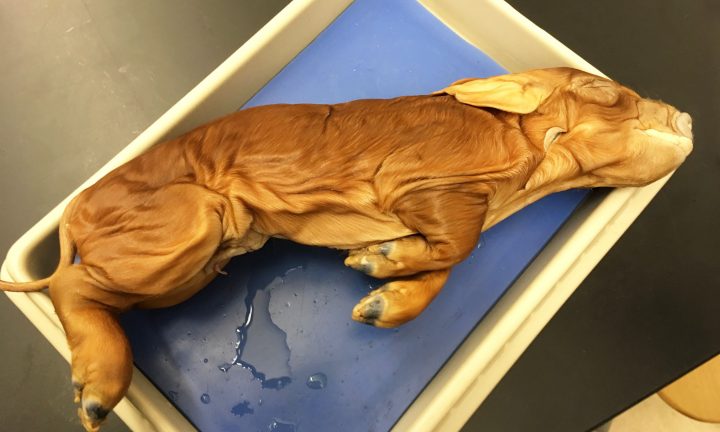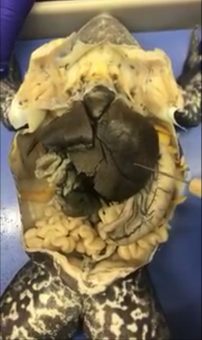
As one would assume, the Zoology classes are filled with a plethora of animal species, ranging from earthworms to sharks, but unlike the veterinary classrooms a few doors down, there is very little life inside. Zoology students with varying majors are required to dissect a multitude of animals in a semester. Some students are hoping they can find a way to bypass having to work with a once alive animal and switch to a virtual dissection.
Online there are virtual dissections ranging from large to small animals. There are some offered for free a list of which can be found on People for the Ethical Treatment of Animals (P.E.T.A.) website. But these free applications tend to only have one or two types of dissections. The applications that have a wide range of specimens that would be necessary for the zoology class are not free. These application can cost anywhere from 100 to 300 dollars, depending on how complex they are.
There are high schools that use these applications to reduce their need for real dissections, since California allows students in K-12 to opt out of dissections; teachers must provide an alternative for learning the material. This is not the case in college, since students are choosing their own classes and accepting the requirements that come along with them. This is a source of contention for students whose goals are to help the animals that they are now being forced to dissect to be able to graduate.
Professor Stolberg teaches the Zoology class at Yuba College and he is a big proponent of being environmentally friendly, making sure to give important discussions on global warming, overpopulation, and deforestation during his class. But he does not agree with using the dissection applications. “I think hands on is best for students. If it were just an application, I don’t think they would retain as much, plus there are medical students in my classes and they need to know how to dissect and move past the uncomfortable feelings that they may have.”
Another worry is that with virtual dissections, the less you actually have to participate. Yuba worries that it would be sending off unprepared science students. Understanding the anatomy of mammals at the very least is crucial to their ability to move further into their undergraduate studies and succeed.

It’s easy to see why, for many biology, environmental science and ecology majors, this dissection seems unnecessary. One anonymous student explained, “Most of us aren’t going to medical school and the only thing that you lose by using this application is surgical skills. When you study anatomy, they don’t make you cut open a dead person everyday, you use figures and models to understand. I don’t see why this is so different. They could easily make surgical skills into a one unit extended component like they do with other classes.”
This seems like an easy solution to the problem to add a separate section, but in reality, Yuba has contracts with other schools that accept the class for transfer and changing it may alter the class’ ability to be accepted. There is no point for them to reconfigure the class and then have it not be acceptable for transfer. This would leave students to have to redo the class at a university which would include the dissections.
Although the complete renovation of the zoology class is unlikely, there is room for change. There are sanitation issues that come along with live dissections. In order to limit the amount of animals dissected, the students will use the same animal at multiple points during the semester. This can lead to an extremely rancid smell in the boxes that hold the specimens. There has not only been odor problems this year, but there has been a problem with mold growing on the specimens.
Since these animals are kept in the zoology classroom, they tend to stay around room temperature, which is optimal for the growth of fungus. They have moisture within the body cavity which is necessary for the mold to thrive. Although this mold is probably not harmful to the students, it’s not something you want to work with. Once it grows on one specimen, it tends to spread to the others.
Along with mold there are a multitude of parasites found within the dissected animals. These parasites include a wide range of stomach worms. Where there are visible worms, there are probably completely invisible eggs that can stay alive even under unlikely circumstances. This can lead to cross contamination by students.Worms aren’t the only infection to worry about. With animals and rotting carcasses can come all sorts of bacteria that can be dangerous. Although this is unlikely, due to the liquid that they are preserved in, all of these possibilities can be reduced by lessening the amount of actual animals being dissected.

The closer students get towards humans on the tree of life the harder a time they have with the dissections. The students have more than likely interacted with the species in their real life such as feeding the pigeons at the park or playing with the piglets at the local petting zoo.
For some, the hardest dissection was the earthworm because it was still alive when dissected. The students are asked to look to see if the blood is still pumping through its body. The worm is anesthetized in alcohol but students don’t know if they can still feel or if they are numbed completely.
Aside from the worms pain, it is hard for students to know that they are the ones having to kill the animal during their dissection. Kayleigh Pontif said,“I can’t stand the way these animals are bred just to be killed so we can dissect them. The companies aren’t going to treat them well if they know they are just being killed anyways. Some of the animals we dissect are murdered even before they have left their mother’s womb.” Pontif’s statement came on the day she was expected to dissect a fetal pig. “I refuse to do it. I will learn the structures necessary but I won’t dissect it.”
When the students cut the fetal pigs open along the stomach, the umbilical cord is still attached. The idea of the piglet being taken from its mother and killed is difficult to swallow. Many worry that the animals are not well kept when the companies know that the animal will be killed soon anyways.
Other students say they aren’t going to stop dissecting because they need the skills, but they agree that there should be options for others. One anonymous student stated, “I want to understand the species inside and out, but if I had a way to do that without taking life, of course that would be my choice.” This was a common thread among the Zoology students but some are eager to learn dissecting skills.
Andrew Hay believes that, “ I want the experience of dissecting since I plan to go to medical school, but I understand how others would want an option to not. We have systems like Mastering Chemistry and Mastering Physics that the students pay for themselves. Why can’t we have something like that for them?”
The reality is that compromise could do a ton of good for the college. They could reduce costs necessary to buy the animals and the class could allow for more students. It also would attract more science students who may be squeamish about dissecting the larger animals.
When looking at this argument, it’s easy to see how students could get emotional, and see it as hypocritical to harm animals when they are going to school to do the exact opposite. But there are also some logical reasons for why animal dissection is a key part of biology. Maybe the answer is truly something in the middle.
There are approximately sixteen dissections done in a semester of zoology, and if the teachers could work to integrate some of the free online dissections as an option for students, they may receive less backlash. Another option for the school is to give students the choice to purchase a virtual dissecting application. Then the student can decide whether the cost is worth it to them. With technology becoming more and more advanced there is no reason why the college cannot find some way to compromise and reach a solution.
I am a 3rd year Yuba College student majoring in Biology. I am transferring to Chico Spring 2018. I enjoy working in a scientific field, where my passion lies in environmental ecological and evolutionary studies. I also enjoy using my extroverted tendencies in communication and media classes. Other than school I am married and have 8 pets. Please feel free to message me or leave comments about any questions or requests.
Comment Policy: Comments are welcomed and encouraged. However, the editorial board reserves the right to edit or delete, without notice, any comments submitted to the blog. For more details, see our full Comment Policy.